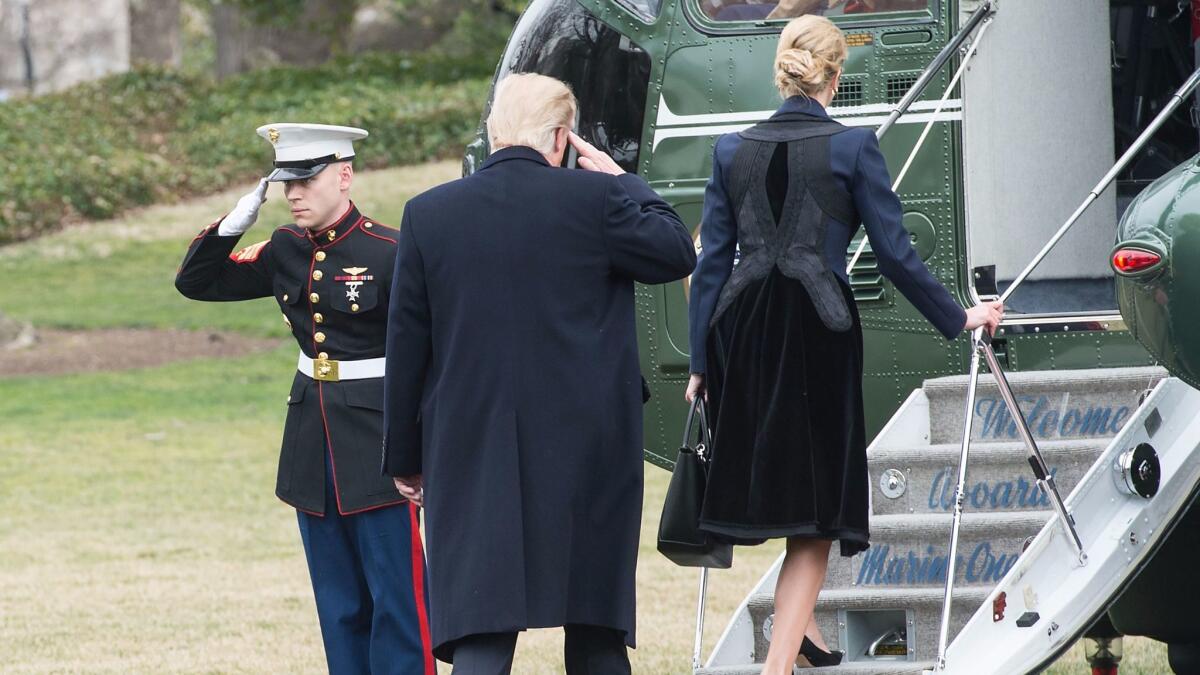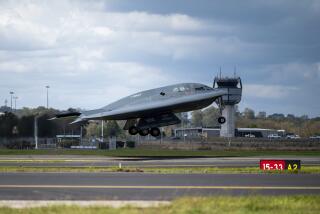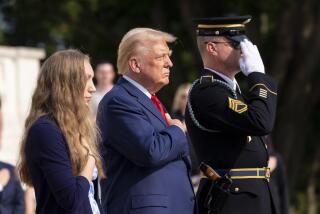Trump travels to Dover Air Force Base to honor first service member killed in action on his watch

- Share via
Reporting from Dover, Del. — President Trump made an unannounced trip Wednesday to witness the return of the remains of a Navy SEAL killed in a raid in Yemen, the first known casualty of an operation Trump ordered, as he confronted the most fraught duty of the office while partaking in one of its most solemn rituals.
At Dover Air Force Base in Delaware, Trump joined the family of Chief Special Warfare Operator William “Ryan” Owens, 36, who died during a raid on a compound used by Al Qaeda in the Arabian Peninsula, the terrorist group’s Yemen-based offshoot.
The operation began as a mission to gather computers and electronic devices believed to contain information about the organization, and possibly about plots in the works. But it devolved unexpectedly into a firefight that also killed more than a dozen women and children.
Among those reportedly killed was the 8-year old daughter of Anwar Awlaki, the American-born Al Qaeda leader who was based in Yemen and killed in a 2011 drone strike. Awlaki has been cited as the inspiration for several major attacks in the West, including the San Bernardino shootings.
The ritual in Dover, called a dignified transfer, was kept private at the request of Owens’ family. Trump, accompanied by his daughter Ivanka and Sen. Chris Coons (D-Del.), were on the grounds for more than two hours.
Speaking Wednesday evening after returning to the White House, Trump called the visit “very sad, very beautiful.”
The remains of service members killed in action are brought to the Delaware base in flag-draped cases, then carried by a six-person team to a vehicle to be taken to a mortuary on the base. According to the Air Force, the dignified transfer is conducted for every service member who dies in a theater of operation.
Media coverage of the transfers were banned in 1991 during the Gulf War, in response to an episode two years earlier in which a television network showed split-screen images of a jovial President George H. W. Bush and the coffins of U.S. personnel killed in Panama.
The policy was lifted by the Pentagon during the Obama administration after a review, and families were given the option to allow media coverage. Since then, Dover has facilitated 1,978 dignified transfers; families attended 83% of them. More than half of families — 55% — allowed coverage, according to Christin Michaud, chief of public affairs for the Air Force Mortuary Affairs Operations.
President Obama traveled to Dover twice to witness such transfers, first in October 2009. He returned in 2011 to witness the remains of 30 service members killed in a helicopter crash in Afghanistan being brought back to the U.S.
In a speech in December, Obama said the visits to Dover made real the potential costs of decisions he made to send troops into conflict.
The Pentagon typically relies on drone strikes against Al Qaeda in the Arabian Peninsula , but U.S. commanders believed they had identified militant headquarters in the village of Yaklaa in Yemen’s Bayda province and wanted to send in troops to gather valuable information about the terrorist group’s operations.
U.S. intelligence agencies consider the group one of Al Qaeda’s most dangerous offshoots because of its repeated attempts to attack Western targets.
The group attempted to destroy a U.S.-bound airliner over Detroit on Christmas Day 2009, tried to take down two cargo planes headed to Chicago in 2010 and claimed responsibility for the mass shooting that killed 12 people at the satirical magazine Charlie Hebdo in Paris in 2015.
The U.S. military’s Joint Special Operations Command plan for the raid had been ready in the final weeks of Obama’s presidency and was awaiting approval, said U.S. officials, who weren’t authorized to speak publicly on the clandestine operation. Obama had opted not to sign off because the proposal called for the raid to take place on the next moonless night in Yemen, which was not until Jan. 28, after he left office.
With Trump’s blessing, U.S. officials said, helicopters carrying members of the elite Navy SEAL Team 6 slipped into eastern Yemen under the cover of darkness in the predawn hours and approached Yaklaa.
The raid ran into problems almost immediately after the assault began. Commandos encountered gunfire and a nearly hour-long firefight ensued, wounding Owens and three other commandos. The others are expected to survive, officials said.
And an MV-22 Osprey tilt-rotor aircraft sent in to evacuate the wounded crash-landed in the desert nearby, injuring three more service members, officials said.
The aircraft was unable to fly and was later destroyed in an airstrike to prevent militants from capturing it.
At least 14 AQAP members, including women, were killed, the U.S. military said.
“There were a lot of female combatants who were part of this,” Capt. Jeff Davis, a Pentagon spokesman, told reporters this week. “We saw during this operation as it was taking place that they ran to pre-established positions as if they’d trained to be ready and trained to be combatants and engage with us.”
Late Wednesday, U.S. Central Command, which oversees military operations in the Middle East, said in a statement that an unspecified number of civilians were also probably killed in the midst of a fierce battle that included gunfire, hand grenades and airstrikes.
“The known possible civilian casualties appear to have been potentially caught up in aerial gunfire that was called in to assist U.S. forces in contact against a determined enemy that included armed women firing from prepared fighting positions, and U.S. special operations members receiving fire from all sides to include houses and other buildings,” the statement said.
Trump repeatedly said on the campaign trail that he’d increase pressure on terrorist groups, but it remains unclear whether the deadly raid was a sign of new aggressiveness from the White House.
Obama had authorized several special operations raids in Libya, Somalia, Syria, and most notably in Pakistan for the 2011 operation to kill Osama bin Laden. The last ground raid in Yemen was in 2014.
Twitter: @mikememoli
ALSO:
Trump administration signals that some bans on U.S. entry could be extended indefinitely
Scalia’s views mixed with Kennedy’s style: Meet Neil Gorsuch, Trump’s pick for the Supreme Court
Democrats see opening in Trump’s stumble on travel ban, move to block Cabinet votes
UPDATES:
5:40 p.m.: This story was updated with Central Command saying it had determined that civilians were likely killed in the raid.
5 p.m.: This story was updated with comment from Trump.
This story was originally published at 3:10 p.m.
More to Read
Get the L.A. Times Politics newsletter
Deeply reported insights into legislation, politics and policy from Sacramento, Washington and beyond. In your inbox three times per week.
You may occasionally receive promotional content from the Los Angeles Times.












